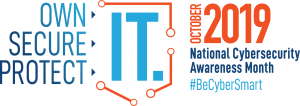
Are your devices safe when connecting to public WiFi? Check out this tip sheet from the Department of Homeland Security.

Are your devices safe when connecting to public WiFi? Check out this tip sheet from the Department of Homeland Security.

October is National Cybersecurity Awareness Month. Check out these four simple steps to staying secure from the SANS Institute:

October is National Cybersecurity Awareness Month (NCSAM). Throughout the month, Denison ITS will be providing information to promote positive cybersecurity habits, and we will also conduct a new cybersecurity awareness training campaign for employees. A link to access training was provided in emails that were sent out on 10/7/19, or you can go directly to our partner, KnowBe4 – https://training.knowbe4.com
September edition:
Scamming You Through Social Media
(https://www.sans.org/security-awareness-training/resources/scamming-you-through-social-media)
OUCH! is the world’s leading, free security awareness newsletter designed for the common computer user. Published every month and in multiple languages, each edition is carefully researched and developed by the SANS Securing The Human team, SANS instructor subject matter experts and team members of the community. Each issue focuses on and explains a specific topic and actionable steps people can take to protect themselves, their family and their organization.
Recently, a Denison employee was tricked by a Tech Support Scam. In this type of scam, a malicious cyber actor wants you to believe that you have a problem with your computer and that they can fix it for you. They work to convince you to voluntarily download and install desktop sharing software to gain control of your computer and files. After they’ve taken control of your computer, their intent is to install software to conduct a range of malicious activities, or to get you to pay them to continue the “support” session.
If you think you have a problem with your computer and need assistance, please contact the ITS Help Desk. Do not engage in remote support services with organizations outside of Denison, unless you are certain that Denison has a business relationship with that organization.
For more information, check out this article from the FTC about how to spot and avoid Tech Support Scams:
https://www.consumer.ftc.gov/articles/how-spot-avoid-and-report-tech-support-scams
July edition:
(https://www.sans.org/security-awareness-training/resources/virtual-private-networks-vpns)
OUCH! is the world’s leading, free security awareness newsletter designed for the common computer user. Published every month and in multiple languages, each edition is carefully researched and developed by the SANS Securing The Human team, SANS instructor subject matter experts and team members of the community. Each issue focuses on and explains a specific topic and actionable steps people can take to protect themselves, their family and their organization.
June edition:
(https://www.sans.org/security-awareness-training/resources/dark-web)
OUCH! is the world’s leading, free security awareness newsletter designed for the common computer user. Published every month and in multiple languages, each edition is carefully researched and developed by the SANS Securing The Human team, SANS instructor subject matter experts and team members of the community. Each issue focuses on and explains a specific topic and actionable steps people can take to protect themselves, their family and their organization.
Google recently announced that they will be renaming “Team Drives” to “shared drives”. This change will not impact Team Drives functionality; it is simply a name change. Google has learned that customers use Team Drives for a lot more than sharing within teams, so calling them “shared drives” makes it easier to understand how one could use them.
iPhone and Android users will begin to notice the change at the end of May in their Google apps. Those accessing Team Drives from a browser will begin to see the name change in early June.
For more information, please see the official announcement from Google.
Need help using a feature or tool in Google G Suite (Gmail, Calendar, Docs, Sheets, Meet, etc.)? Google has released a new version of their Learning Center – check it out here.
Protecting data used for college business is a shared responsibility. If you store important files only on your computer hard drive, your data are at risk for loss or corruption – whether from hardware or software failure, virus infection, or theft. To protect important data, please adopt a recommended file storage location or backup approach. Contact the ITS Help Desk for assistance.